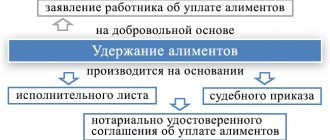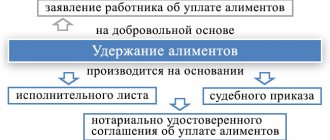On March 7, 2021, President of the Russian Federation V. Putin signed Federal Law No. 48-FZ, which establishes the possibility of recognizing in court an alimony debtor as missing if he has been on the executive wanted list for more than 1 year. In the future, the claimant has the right to apply for a survivor’s pension instead of alimony.
The problem of non-receipt of collected alimony in favor of minor children due to the fault of defaulters has been discussed for a long time by legislators in the social sphere of the Government of the Russian Federation.
In October 2021, bill No. 277183-7 “On amendments to Art. 278 of the Civil Code of the Russian Federation and the Federal Law “On Enforcement Proceedings” was submitted to the State Duma for consideration and adopted on February 21, 2021.
The alimony debt of citizens of the Russian Federation reaches a total of approximately 10 billion rubles. Every third collector of alimony in favor of minor children is a recipient of alimony only “on paper”, but in fact becomes the owner of a significant amount of alimony debt , which even bailiffs cannot collect.
Why recognize an alimony defaulter as missing?
A child support worker can be recognized as missing through the court if he has been absent from his place of residence for more than 1 year. This is necessary to issue a survivor’s pension to a child or other recipient of alimony. It will be paid in lieu of alimony.
But this does not mean that alimony stops accruing. The debt continues to form, but now the Pension Fund of the Russian Federation will collect it if the debtor shows up.
The procedure for recognizing an alimony debtor as missing and the procedure for assigning a pension instead of alimony is regulated by:
- Art. 65 Federal Law “On Enforcement Proceedings”;
- Art. 10 Federal Law “On Insurance Pensions”;
- Art. 5 Federal Law “On state pension provision in the Russian Federation”.
Minus for parents and bonus for children
For those who are trying unsuccessfully to find their ex-husband (wife) who is hiding from alimony, the amendment to the law is a real way out of the situation. According to the new provision, after a year of unsuccessful searches, the recipient of alimony will be asked to recognize the debtor as absent (missing), and the child will be assigned monthly state assistance.
A significant disadvantage and a huge problem for a negligent parent will be if he actually did not disappear anywhere, but ignores mandatory payments and hides from bailiffs. The law has developed a number of measures on the basis of which the funds spent by the state will still be recovered from the alimony provider, only in more stringent variations.
In what cases is an alimony defaulter considered missing?
In accordance with Art.
42 of the Civil Code of the Russian Federation, in order to recognize a child support worker as missing, it is necessary that he cannot be found for 12 months. It is possible if the citizen:
- does not live at his usual place of residence;
- does not communicate by phone;
- did not apply to the social protection department to apply for benefits or subsidies;
- is not registered with the employment center;
- does not conduct real estate transactions;
- did not register the car or deregister it;
- did not apply to the Pension Fund to assign a pension or to receive maternity capital.
Part 2 art. 42 of the Civil Code of the Russian Federation helps set the date from which 12 months will be counted:
- if the last day on which he made contact is known, then the period begins to count from the first day of the next month;
- if the exact date is unknown, then the calculation is carried out from January 1 of the next year.
How to put a child support debtor on the wanted list?
Calculation of child support
What happens next and responsibility for concealing the debtor
The moment the defaulter shows up, he will need to restore the documents and explain the reasons for his long absence. Bailiffs can visit him without the presence of the police and detain him to process alimony payments, including for the past time.
According to Art. 44 of the Civil Code of the Russian Federation and Art. 280 of the Code of Civil Procedure of the Russian Federation, the court makes a new decision upon discovery of the defendant and declares the previous decision to assign an insurance pension invalid.
Civil liability for failure to report the appearance of a former spouse is imposed on the recipient of alimony. For obvious reasons (state support is greater than alimony), the child’s mother can hide the fact of discovery of the debtor and not inform the Pension Fund of the Russian Federation, the Federal Bailiff Service, or the court.
Based on Art. 1102 of the Civil Code of the Russian Federation, the entire illegally obtained amount will be recovered from her, or under Art. 159.2 of the Criminal Code of the Russian Federation, a case will be opened for theft of social benefits and provision of knowingly false testimony.
Step-by-step procedure for recognizing a child support worker as missing
The alimony claimant can go to court. To do this, he must follow the following procedure:
- Submit a search report to the FSSP department.
- After 12 months, receive a certificate stating that the search did not produce results.
- Collect documents.
- File a claim.
- Submit documents to court.
- Get a court decision.
- Contact the Pension Fund to apply for a pension.
Note! The recipient is not required to go to court. If he does not want to recognize the debtor as missing and issue a pension, he may not do this.
If the recipient wants to go to court, then there is no need to delay. There is no statute of limitations for going to court, but if you delay, the information from the FSSP will lose relevance and the court will not accept it as evidence.
Put on wanted list
The first stage is putting the debtor on the enforcement wanted list. The bailiff or the recipient can put the person on the wanted list.
To do this, the debtor must meet the following requirements:
- debt is not less than RUR 10,000;
- does not get in touch;
- does not live at the place of permanent residence;
- resigned and did not inform about his new job.
To begin an enforcement investigation, you need to submit an application to the bailiff who is conducting enforcement proceedings. After 3 days, he will send a wanted order to the address of the debtor and the recipient by mail. The search is carried out on the territory of the Russian Federation and foreign countries where civil servants are vested with such responsibilities.
What is the purpose of the search:
- Find where the debtor is located.
- Identify the property of the alimony holder so that the bailiff can sell it and pay off the alimony debt.
- Inform the debtor that administrative penalties will be applied to him.
In the process of searching for a debtor, the bailiff must:
- collect information about the debtor’s property;
- visit and examine his apartment;
- interview neighbors and family members;
- publish a wanted notice in the media;
- check the debtor’s pages on social networks;
- send requests to the Federal Tax Service, Social Insurance Fund, Rosreestr, Pension Fund;
- check whether the debtor has applied to medical organizations;
- to clarify whether unknown corpses similar to the missing one have been registered;
- find out whether his death was registered.
If the listed measures do not produce results within 12 months, then the bailiff closes the enforcement proceedings on alimony. The writ of execution or court order is returned to the claimant.
In accordance with Art. 65 Federal Law of 2007 No. 229, the bailiff must inform the recipient of alimony that he has the right to go to court and declare the debtor missing. If the bailiff did not do this, then the recipient can contact him himself and receive a certificate.
Prepare a claim
In accordance with Art. 131 of the Code of Civil Procedure of the Russian Federation, a statement of claim to recognize an alimony debtor as missing must contain the following information:
- name of the district or city court;
- last name, first name, patronymic, address and telephone number of the applicant;
- debtor data;
- name of the claim;
- information about why it is necessary to recognize the debtor as missing;
- amount of debt;
- information about the search;
- the date from which the debtor did not contact;
- reference to law;
- a request to recognize the debtor as missing;
- list of documents;
- date and signature.
When filing a claim in 2021, a state fee of 300 rubles is paid, the amount of which is established by Art. 333.19 Tax Code of the Russian Federation. Payment details are published on the court information boards, as well as on the official website. The website has an online calculator service and the ability to generate a receipt.
Sample application
Collect documents
A copy of the statement of claim is accompanied by a package of documents (Article 132 of the Code of Civil Procedure of the Russian Federation), which includes:
- petitions to call witnesses and request documents from bailiffs and other government bodies;
- check for payment of state duty;
- certificate of debt settlement from the bailiff;
- a decision to carry out search activities that did not produce results;
- passport details of the plaintiff;
- certificate from the place of residence of the debtor;
- children's birth certificate.
On each copy you must write: The copy is correct, date, full name. and the applicant's signature.
Submit documents to court
In 2021, documents must be sent to the district or city court at the place of last residence of the defaulter. A claim can be filed:
- Personally. Appointment times can be found on the court website or by phone. You need to have your passport with you.
- By mail. A cover letter and an inventory of the contents must be enclosed in the envelope along with the documents.
- Through a representative. A lawyer can take documents to the court. To do this, you need to conclude an agreement with him and make a notarized power of attorney in his name.
- Through the GAS Justice portal. To do this, you need a personal account on the State Services website and an enhanced electronic qualified signature).
Get a court decision
The trial does not take much time. The judge examines the submitted documents and responses to requests. If there is no information about the defendant for more than 12 months, the judge will satisfy the request.
The court decision acquires legal force one month from the date of announcement. On the day the decision enters into legal force, the applicant must appear at the court office. The court secretary will issue an extract from the court decision and put a note in the court decision that it has entered into legal force.
Arbitrage practice
If the procedure is carried out correctly, but there is no information about the debtor, then the court will satisfy the request. An analysis of judicial practice shows that the court satisfies the applicant’s demands if:
- It is necessary to recognize the debtor as missing in order to issue a survivor's pension for a child (Decision of the Volchikhinsky District Court of the Altai Territory dated June 23, 2021 in case No. 2-336/2017).
- The plaintiff put the debtor on the wanted list (Decision of the Khasavyurt District Court of the Republic of Dagestan dated May 17, 2021 in case No. 2-118/2017).
- The defendant has a large alimony debt (Decision of the Oktyabrsky City Court of the Samara Region dated July 30, 2021 in case No. 2-283/2020).
Effect of the law
The introduced provisions of the law come into force if several conditions are met. The citizen receives the specified status:
- if he does not pay the required amounts in favor of the children;
- has been on the executive wanted list for a year.
The lack of information about the whereabouts of the defaulter and his attempts to establish contact with his family is a reason for assigning a survivor’s pension.
The main reason for introducing amendments to the law is the accumulation of a large amount of debt due to the inability to find alimony payers. As judicial practice shows, many single parents do not receive the necessary financial assistance to support their children, which leads to low family income. This violates the child’s right to a decent standard of living.
Consequences for the debtor
When the court decision comes into force, the following legal consequences occur:
- The debtor's property is transferred to the trustee for management. For this purpose, another court hearing is held. The candidate for the position of manager is selected by the guardianship authorities. But this does not mean that the debtor loses ownership. He remains the owner of the property, but in order to preserve it, the property is temporarily transferred to management.
- The debtor's property may be sold to pay off alimony, loans, and other debts.
- The debtor's wife can contact the registry office to dissolve the marriage unilaterally (Article 19 of the RF IC). To do this, she does not need to obtain the consent of her husband or the trustee of the property.
- If the debtor acted as a guarantor, issued a power of attorney, or was himself a trustee, then the obligations are terminated.
- The defendant's dependents can apply for a survivor's pension.
What to do after the defaulter is declared missing?
When a court decision to declare a person missing comes into force, the recipient of alimony can apply to the Pension Fund of the Russian Federation to apply for a pension.
To do this you need:
- Collect documents.
- Put a mark on the court decision to enter into legal force and receive an extract from the court decision.
- Submit an application for pension payment.
- Submit documents.
The pension begins to accrue from the month following the month of application. If alimony was collected for an adult relative or a child over 14 years old, then the money is transferred to his personal bank account. And if child support was paid for a child under 14 years of age, then the money will be transferred to the nominal account of the parent or guardian.
Where to contact?
You can submit an application to the Pension Fund of the Russian Federation:
- At a personal reception. You can make an appointment by calling the phone number listed on the Pension Fund website.
- Through MFC. The application can be submitted at any MFC in the city.
- By mail. The application must be accompanied by a covering letter, a list of investments, and documents confirming the applicant’s right to a pension.
- On the website of the Pension Fund. To do this, you need to have a personal account on the State Services portal.
- Through the State Services portal. The portal redirects to the Pension Fund website.
How to make an application?
Sample application for a pension:
- name of the branch of the Pension Fund of the Russian Federation;
- Full name, citizenship, registration address, contact phone number, SNILS, passport series and number, marital status, presence of children);
- title of the application;
- child’s details (series and number of passport or birth certificate);
- details of the legal representative;
- determination of the type of pension provision;
- the rights and obligations of the applicant;
- applications;
- date of;
- signature.
When writing an application, abbreviations and abbreviations must not be indicated.
Sample applicationWhat documents are needed?
To assign a pension you will need:
- SNILS of the applicant and the child;
- passport of the applicant and child;
- birth certificate;
- power of attorney (if necessary);
- documentary evidence of the dependent’s relationship with the breadwinner;
- court decision declaring the debtor absent;
- work record of the defendant.
As a result of checking the submitted data, the dependent is assigned a survivor's payment, which will replace alimony.
Legal basis
How alimony debtor is recognized as missing The procedure for receiving social payments instead of alimony due to children includes several stages: The legislation of the Russian Federation gives the father and mother the same rights and responsibilities for the upbringing and development of a minor child. Often one of them evades his obligations, does not pay alimony and does not appear in court when required. In this case, recognition of the alimony debtor as missing is justifiably applied.
- if he does not pay the required amounts in favor of the children;
- has been on the executive wanted list for a year.
How is a survivor's pension calculated?
The exact amount of the pension is calculated by employees of the Pension Fund of the Russian Federation. The amount of the pension depends on whether the missing person was officially employed.
Types of survivor's pension
| Options | Insurance | Social |
| Regulatory regulation | Federal Law “On Insurance Pensions” | Federal Law “On state pension provision in the Russian Federation” |
| Assignment condition | If during his life the missing person was officially employed for at least 6 months | If the debtor had no experience |
| Size in year | Calculated individually, depending on:
| If there is no one breadwinner Until 04/01/2021 – 5,606.17 After 04/01/2021 – 5,751.93 If there is no mother and father Until 04/01/2021 – 11,212.36 After 04/01/2021 – 11,503.88 |
| Additional payments | No | If the family income is less than the subsistence level, then you can apply for an additional payment up to the subsistence level. |
Lawyer's answers to private questions
Who are the stakeholders?
An application to the court for recognition as missing is submitted by an interested person. A specific list is not defined by law. These may include: family members, close relatives, dependents, creditors; state bodies - prosecutor's office, guardianship authorities.
Is it possible to deprive a father of parental rights if a court decision is made to declare him missing?
Recognition of a father as missing is not considered grounds for deprivation of parental rights provided for in Article 69 of the IC of Russia.
Can a child’s guardian file a lawsuit to declare the father missing if the father is deprived of parental rights?
Yes. The guardian may apply to the court in the interests of the child.
If a child is in an orphanage, then who should go to court to declare the mother missing?
The plaintiff in the process will be the head of the orphanage.
What to do if the debtor does not appear for more than 5 years?
In this case, it will be necessary to declare him dead through the court.
Procedure for filing a claim
Interested persons (mother, father, OOP) must write a statement to the court, while by default it is considered that the defendant is alive, but the bailiffs could not find him at all known addresses of presence and work. The court sends a request confirming this fact to the FSSP.
What are the main aspects considered:
- the place of residence of the alimony holder is established;
- information about whether or not a citizen appears at his place of registration during the year;
- what measures the applicant took to search;
- the presence of circumstances indicating that the defendant is hiding;
- how interested is the plaintiff in recognizing the ex-spouse as missing.
To receive a positive decision, the applicant must prove that all personal measures to find the debtor were unsuccessful. This is supported by documents from the FSSP confirming a similar result in the collection of alimony. A large amount of evidence collected increases the chance of a positive court decision declaring the defendant missing.




